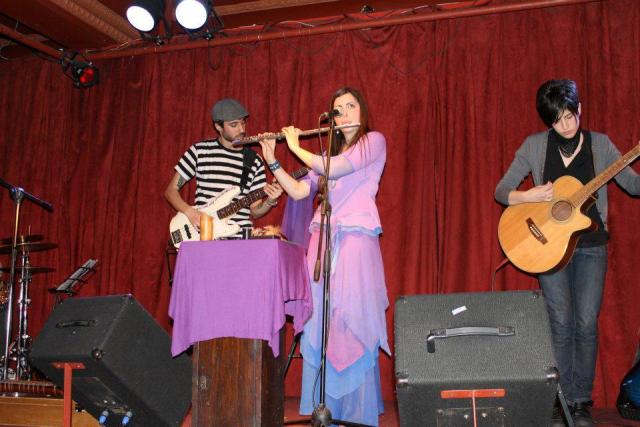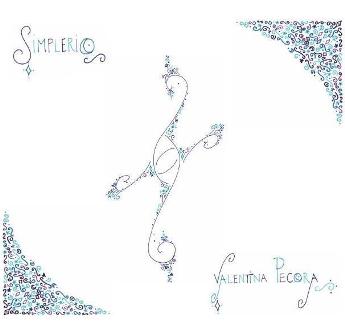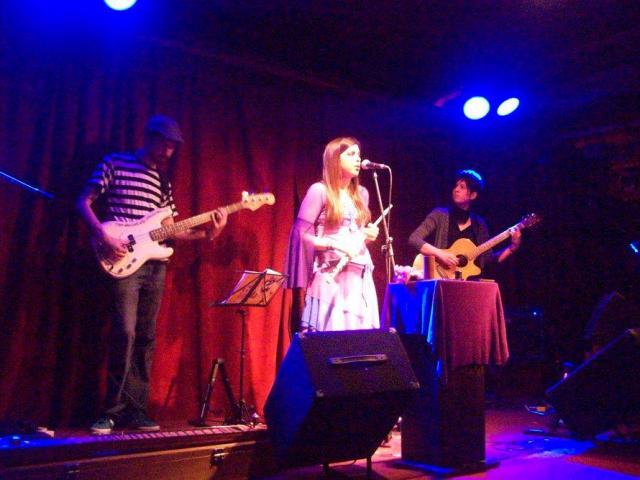You are the one who creates the world you inhabit, and that world is going to be as peaceful as the eye through which you see it. The light that reigns in your reality comes from it, and it reaches everything as if it proceeded from a lighthouse that can cut to the very heart of the most hermetic of nights.
But in the same way that faith has got a diaphanous facet, it has also got a dark side that can thicken the world with demons, with fugitive shadows that can murk every new beginning and (eventually) envelop it in a terrible intentionality.
The frontier that separates one from the other is permeable, and what you see as radical can be deemed as insignificant by the person next t you.
And “Simplerio” moves along that mutable frontier, trying to elucidate what to believe in and what to leave alone. Issued by Perro Andaluz in 2011, “Simplerio” is the first studio album by Valentina Pecora, a young flute player that has been involved in music all her life. Her stage career started at age ten, and today she keeps a steady flow of live performances, at the same time she works as a flute teacher. Valentina wrote all the songs, designed the artwork of the album and she even produced it. Her main instrument is the transverse flute, but on “Simplerio” she also played several other flutes, guitars and many different types of percussion instruments. She was aided by Ney Peraza, Julia Melo, Gonzalo Reyes and Ernesto Díaz on guitars, Federico Pérez on bass, Rodrigo del Castillo on Peruvian cajón, Diego Revello on violin, Leo Giovannini on percussion and Guillermo del Castillo on bass and electric sitar. Led by Valentina, this ensemble created an album with a sonority of its own, and a very distinctive intellectual depth.
At its core, “Simplerio” (which could be translated into English as “the easiest of things”) tries to cast light on a series of questions that we all can relate to.
Where should we put our faith so that we can use it to build a new world, and not to destroy the one that’s already there? Where do we place our trust? How can we bring into being an “illusion that illuminates”? How do we close the distance that separates dialogues from reactions? How is the ritual of affection configured if (as it’s described on the lyrics) the way has got no handrails, and everything hangs precariously from a crane of crystal?
“Simplerio” poses all these questions, and it does so permanently, like a flood of thoughts that never relents. But even when the album has got such a thematic intensity, the overall mood is one of gentle caresses, not of heavy ruminations. Its songs are as sweet as the title of “Frutillas de Algodón” [Cotton Strawberries] suggests, and there’s no offhandedness on the lyrics, no matter how deep and thoughtful they are.
The music would never let that happen. Molded around Eastern modulations and harmonies, “Simplerio” basically brings one thing to the listener, and that is solace. In more places than one, the album sounds like a mantra, and it partakes of the character and vision of its composer. A person with a very honest glance that says a lot when speaking for the very simple reason she has got a lot to say, the first time I talked to Valentina she told me something that I later realized summed up not only this album but also the way in which she faces reality: “The world is inside”.
And from her inside, from that world she has built (and that she has let other built up as well) she answers all the questions that are asked on the album, in a way that’s unequivocal: underlining the importance of believing in our feelings to fuel the engine of our achievements.
This might come across as obvious, but it’s not. Or (at the very least) it’s not as understandable as it should be. Otherwise, why is that we all have so much difficulty believing in what our hearts says, and following these dictates even when we know they’re absolutely right?
In all likelihood, because love is fragile. Too fragile.
And all that’s fragile scares us, because we know that others might break it up, even unwillingly. But that’s no reason to turn our backs on it. “Simplerio” reminds us that fragility is the common denominator of all that’s important in life. Strawberry cotton, cardboard dreams, cranes of crystal… Everything’s so vulnerable, and we must learn to protect it. It’s an enormous risk we run. But such a risk is the one that makes our lives worthwhile.
It’s a matter of faith
Neruda himself said it. Nothing can save us from death. So, we should at least let love save us from life. And an album such as this one emphasizes to which extent being able to believe gives wings to our emotions, how faith enables us to take that vital step which can bring us to the perfect distance from everything. Faith is the most eloquent and crystalline language, is the language shared by those who know success. And “if we learn to listen to ourselves, this crystal dream will never die”. And that’s why an album like “Simplerio”. So that we can listen, understand what we’re listening to, and manage to do something about it.
The key tracks are “Frutillas de Algodón” and “Parámetro Paraíso” [Parameter Paradise]. Both are very rich compositions in instrumental terms, and very to-the-point despite their long running times. They are songs that sum up the world-searching nature of the whole album perfectly.
These two songs are found at the beginning, and they act as a sort of prologue. And as the album is climaxing, there come two other pivotal numbers, “El Ruido Del Candado” [The Sound Of The Lock] and “Cuerpo Casa Corolario” [Body Abode Corollary]. These two songs are important since they touch upon some of the most damaging consequences of faith, the degree of alienation that unreasonable beliefs can redound to. “El Ruido Del Candado” in particular reminds me of a song like Richard Thompson’s “Outside Of The Inside”. Although the dangerousness of the protagonists is nowhere comparable, in both songs there’s such a radical faith at play that the ability of the characters to perceive both reality and their own capabilities is heavily compromised.
On a personal note, I have to mention “Hoy” [Today], “Tanto” [So Much] and “Punto Fijo” [Fixed Point]. These are three excellent examples of how the compositions found on the album have been nurtured by Eastern influences. They are songs that will make any anime enthusiast rejoice; all three of them could have been extracted from the soundtrack of a show like “The Charcoal Feather Federation” (“Haibane Renmei” in Japanese). They speak volumes of the attention to detail paid by her composer, and her true commitment to her art.
Yet, Valentina herself said what’s more important in the end.
“I’ve got so many colors that from the outside I see myself white”, she announces as the album runs its course, on the song “Anywhere’s Face” – a song that combines lots of different languages at vertiginous speed.
And that’s just right. She’s got so many colors. And each color is a world. And she had said as much to me before, “the world is inside”.
Still, she had not told me that a single person could have more than one color – much less that each and every color could be so important. “Simplerio” is like a big box of colors in which everything is beautiful and deep. Each person can paint with the one he likes best. He can paint the earth, the tide, the eyes in which to be reflected like a moon burnished by the miracle of love. And he shouldn’t be afraid if the end result looks fragile. That will be a measure of its true value.
The painting itself can take a long time. Valentina also reckoned as much: “this big climbing pant/will take a whole life/of watering and watering”. Faith and beliefs alone won’t do. Constancy and dedication are needed. On this album, she can already see the fruits of having devoted her life to art, drop by drop of effort and illusion. She might record many more albums. She probably will. But her parameter paradise has already been set. Good for her. And it would be great if every single one of us could also set his own.
Maybe it’s not that hard.
Maybe it’s the simplest of things.
It’s a matter of faith.
You can listen to Valentina’s music on her Bandcamp profile.



